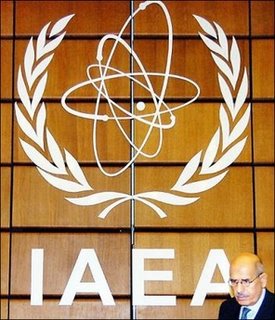Iran will not Bend to these Pressures

Director-general of International Atomic Energy Agency (IAEA) Mohamed ElBaradei is seen in the boardroom of IAEA Headquarters in Vienna, October 2005. The United States and Europe have urged Iran to suspend uranium enrichment to show it does not seek atomic weapons as Washington warned of Security Council action if Tehran did not comply.(AFP/File/Joe Klamar)
by Michael Adler
June 15, 2006
VIENNA (AFP) -The United States and Europe have urged Iran to suspend uranium enrichment to show it does not seek atomic weapons as Washington warned of Security Council action if Tehran did not comply.
Speaking at a meeting in Vienna of the UN nuclear watchdog, US ambassador Gregory Schulte said the goal was "to open negotiations for a long-term agreement" on giving Iran benefits in return for guarantees its nuclear program is peaceful.
But Iran's supreme leader Ayatollah Ali Khamenei said Thursday in Tehran that his country would not bow to pressure over its atomic program, implicitly rejecting the calls to suspend enrichment.
"The Islamic Republic of Iran will not bend to these pressures," he said, referring to an incentives proposal from Britain, China, France, Germany, Russia and the United States.
The international community's "carrot-and-stick" policy over Iran's nuclear program is counterproductive, Iranian ambassador Ali Asghar Soltanieh said in Vienna.
"In the case of Iran, humiliation and the use of language of threat of referring the nuclear dossier to the UN Security Council... have had serious impact on mutual trust and confidence on parties involved and thus the process of negotiations," he said.
The problem is that "Iran is not implementing any of the confidence building measures" requested by the board," Schulte told the International Atomic Energy Agency's 35-nation board of governors.
Schulte called on Iran to meet "IAEA and (UN) Security Council requests to suspend all activities related to uranium enrichment and plutonium reprocessing," nuclear fuel work that can also make atom bomb material.
If not, Iran would face "the weight of the Security Council", Schulte said.
The Council has punitive powers, unlike the IAEA which is merely a verification and monitoring organization, and can impose sanctions.
"We all hope that the leadership of Iran will make the best choice for the people of Iran," Schulte told reporters.
The US call was echoed in statements by Austria on behalf of the European Union and France on behalf of EU states Britain, France and Germany which seek to resume talks with Iran on guaranteeing Tehran will not seek nuclear weapons.
French ambassador Francois-Xavier Deniau said Iran's "cooperation with the agency has been reduced the last several months to almost nothing."
But Austrian ambassador Thomas Steltzer said: "We are encouraged that a new momentum to find a negotiated solution to this issue has been created in the last few days."
Non-aligned states on the IAEA board read out a statement the 114-nation non-aligned movement had issued in Malaysia in May backing Iran's right to nuclear fuel work.
In Shanghai, Russian President Vladimir Putin said Iran had the right to nuclear technology, as he entered a meeting with Iranian leader Mahmoud Ahmadinejad.
Putin also said: "Iran has reacted positively to the proposals of the six sides. Iran is ready to begin talks and in the near future I hope it will state its position at the time of the start of the talks."
The IAEA on Thursday heard two reports from its chief Mohamed Elbaradei that said Iran has failed to cooperate fully in resolving concerns that it is secretly trying to develop a nuclear bomb.
The reports, one from April 28 and the other from last week, also show Iran is pressing ahead with uranium enrichment.
But ElBaradei said in opening the IAEA meeting Monday that he remained "convinced that the way forward lies through dialogue and mutual accommodation among all concerned parties."
Diplomats agreed that nations were being relatively restrained at the IAEA meeting in order not to disturb diplomacy over getting Iran to return to talks.
"No one wants to rock the boat," one diplomat said.
The six world powers have offered Iran talks on incentives that include the United States lifting some of its trade sanctions against Iran and international support for the "building of new light water reactors in Iran," according to a copy of the proposal shown to AFP.
But European Union foreign policy chief Javier Solana held off in handing over the offer in Tehran on June 6 from presenting a list of possible Security Council sanctions if Iran did not comply, diplomats said.














0 Comments:
Post a Comment
<< Home